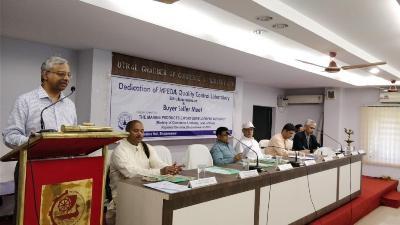BHUBANESWAR, 19 February 2018 : A state of the art laboratory to check traces of antibiotics in shrimps and other marine products was formally launched here today, in a concerted attempt to address concerns of USA, Japan and the European Union (EU) for stringent quality controls over exports of seafood from India.
Set up by the Marine Products Export Development Authority (MPEDA), the QC laboratory at Nayapally in Bhubaneswar, the fifth to be set up in the country, is fully equipped to check presence of Chloramphenicol and Nitrofuran, the two banned antibiotics for which importers in USA and Japan have particularly insisted for analysis.
Accredited by NABL (National Accreditation Board for Testing and Calibration and approved by EIC (Export Inspection Council of India) under Laboratory Approval Scheme (LAS), the laboratory has started analysing Chloramphenicol and Nitrofuran metabolites in samples drawn under the National Residue Control Programme (NRCP) and those drawn from the market.
If any samples are screened positive in ELISA Labs at Bhubaneswar, Balasore and Sonarpur, these will be checked and confirmed at the QC Lab, which has also developed methodology for another antibiotic, Tetracycline, and its validation is under process.
The laboratory was dedicated to the seafood export industry at a function here by Dr. Gagan Kumar Dhal, IAS, Agriculture Production Commissioner, Govt. of Odisha.
“By setting up its laboratory in Odisha, MPEDA has met a longstanding demand from the seafood exporters,” he said, adding: “Our seafood exporters have set global benchmarks. We must follow this benchmark which is going to lead the seafood sector in the next few decades.”
Presiding over the function, MPEDA Chairman Dr. A Jayathilak said there is a sustained demand from the industry to have a laboratory with the most modern equipment to identify the antibiotic residues up to the lowest and most microscopic levels.
“We have had some instances of presence of antibiotics in the past, especially the most commonly detected Chloramphenicol and Nitrofuran metabolites, and it has led to immediate response. We pass on the information immediately down the stream to the exporters and the farmers but you need to have the best equipment and manpower in place for it,” he noted.
“This lab, accredited by the NABL, is the fruition of the longstanding demand of the seafood export sector of Odisha, which is making long strides in seafood production and export sector. We are awaiting approval from the EIC for the samplers who are authorized to go and sample the products so that we can start pre-export testing soon,” he said, thanking the Odisha government for providing premises for the lab on lease.
Alongside, the lab is developing facilities for validation of sulphonamides. After completion of testing facilities for Tetracycline and sulphonamides, the lab will be fully ready for analysis of commercial samples meant for export to the EU also. Currently, these substances are being tested at other QC laboratories of MPEDA.
At present, the QC Laboratory at Bhubaneswar can analyse samples submitted by farmers, processors and exporters as part of their quality assurance for residue free raw material for processing and exporting. In addition, MPEDA has two ELISA screening laboratories at Bhubaneswar and Balasore which are issuing Pre-Harvest Testing (PHT) Certificate to farmers for facilitating export to the EU market.
Hailing seafood exports from India as ‘a shining success story’, Dr. Jayathilak said the country is poised to cross six billion dollars worth of exports for the first time. “This has been made possible because both the farmers and exporters have paid a lot of attention to the role of quality. Many exporters in their own export houses have established in-house labs, but they have also made use of the other laboratories to ensure that the produce that they export out of India conforms to the most stringent norms laid down by the importing countries,” he added.
Among those present on the occasion Kalikesh Naryan Singh Deo, MP; L N Gupta, Addl. Chief Secretary, MSME, Govt. of Odisha; V Padmanabham, President, Seafood Exporters Association of India (SEAI); Tara Ranjan Patnaik, Vice President, SEAI; Dr. Kamlesh Mishra, Regional President, SEAI; B K Sahoo, Member, MPEDA; Pratap Ranjan Rout, Jt. Director of Fisheries, Govt. of Odisha; and B Sreekumar, Secretary, MPEDA.
Deo highlighted the role of seafood sector in the exports from Odisha and congratulated MPEDA in setting up the lab at Bhubaneswar.
Gupta stated that Odisha had recorded 20-fold growth in exports and was recognized as the Champion State of export by the Ministry of Commerce & Industry. “The state envisages an export turnover of Rs. 20,000 crore by 2025 and the seafood sector has been identified as a leading sector to achieve this goal,” he noted.
Padamanabham offered total support for the lab and said the SEAI would help other states in significantly augmenting seafood exports from the country.




















